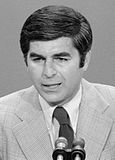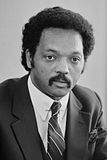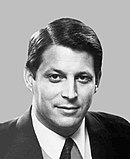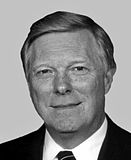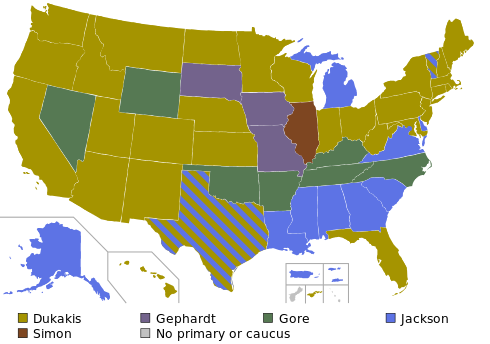Democratic Party presidential primaries, 1988
|
|
||||||||||||||||||||||||||||||||||||||||||||||||||||||||||||
|
||||||||||||||||||||||||||||||||||||||||||||||||||||||||||||
|
||||||||||||||||||||||||||||||||||||||||||||||||||||||||||||
|
|
||||||||||||||||||||||||||||||||||||||||||||||||||||||||||||
|
||||||||||||||||||||||||||||||||||||||||||||||||||||||||||||
The 1988 Democratic presidential primaries were the selection process by which voters of the Democratic Party chose its nominee for President of the United States in the 1988 U.S. presidential election. Massachusetts Governor Michael Dukakis was selected as the nominee through a series of primary elections and caucuses culminating in the 1988 Democratic National Convention held from July 18 to July 21, 1988, in Atlanta, Georgia.
Having been badly defeated in the 1984 presidential election, the Democrats in 1985 and 1986 were eager to find a new approach to win the presidency. They created the Democratic Leadership Council (DLC.) They felt more optimistic this time due to the continuing Iran Contra scandal plus the large gains in the 1986 mid-term election which resulted in the Democrats taking back control of the Senate after six years of Republican rule. They were looking for a young, inspiring candidate who could appeal to women, national security Democrats, and minorities. To this end party leaders tried to recruit the New York Governor, Mario Cuomo, to be a candidate. Cuomo had impressed many Democrats with his stirring keynote speech at the 1984 Democratic Convention, and they believed that he would be a strong candidate. However, Cuomo chose not to run and as a result, the Democratic frontrunner for most of 1987 was former Colorado Senator Gary Hart. He had made a strong showing in the 1984 presidential election and, after Mondale's defeat, had positioned himself as the moderate centrist many Democrats felt their party would need to win.
...
Wikipedia

